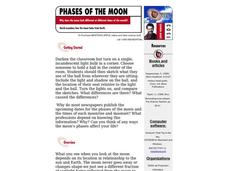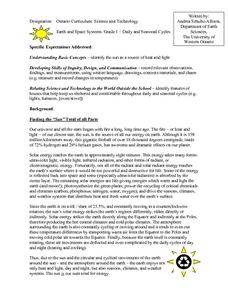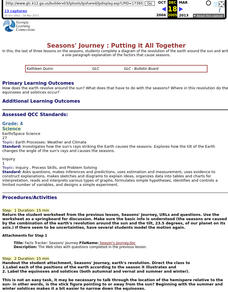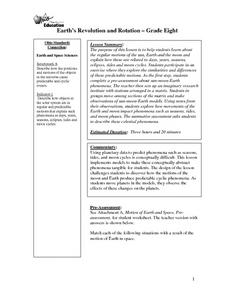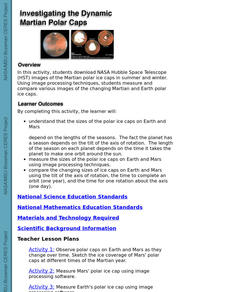Curated OER
Comparing Earth and Mars
Students work together to compare and contrast Mars and Earth. Using the internet, they answer questions given to them by their teacher and calculate answers showing their work. They graph their answers and discuss the results of the...
Space Awareness
Climate Zones
The climate at the equator is hotter than the climate at the poles, but why? The instructional activity goes in depth, explaining how the angles of illumination relate to the heating rate at different latitudes and seasons. Scholars use...
Curated OER
Earth and Sun's Distance
Students consider the shape of the Earth's orbit around the Sun. They view the first segment of Science Court video and use Timeliner software to construct a scale of the distance between the Earth and the Sun.
Curated OER
Solar System: The Four Inner Planets and Earth's Moon and Astronauts
Second graders read THe Magic School Bus: Lost in the Solar System. In this language arts and science lesson, 2nd graders explore the four inner planets. Students view the inner planets using Google Earth.
Curated OER
Redesign the Rover: Mars Research Year-Round
Students discuss the solar system, the planets, periods of orbit and revolution. In this space lesson students discuss the importance of the study of Mars and brainstorm ideas on how NASA might solve its Rover design problem.
Curated OER
Winter Season
Students recognize the relationship between Earth's tilt and the Winter season. In this Winter instructional activity, students work in pairs to complete make frost and design snow goggles. Students experiment a hand lens to study the...
Curated OER
Does the Distance Between the Earth and Sun Cause the seasons?
Students reflect upon the concepts of seasons. The concepts are taught using a variety of different teaching approaches. A activities lead to a reflection that will help students to make a cognitive transfer of information form...
Curated OER
Heating the Earth
Students explore how the angle of sunlight affects the Earth's temperature and seasons and then apply this understanding to their local situation.
Curated OER
Phases of the Moon
Students explore why when you examine the moon depends on its location in relationship to the sun and Earth. The moon never goes away or changes shape-we just see a different fraction of sunlight being reflected from the moon to Earth.
Curated OER
Daily and Seasonal Cycles
First graders identify the sun as a source of heat and light. They identify features of houses that help keep use sheltered and comfortable throughout daily and seasonal cycles. Students are told that summer is the best season to...
Curated OER
Seasons' Journey : Putting it All Together
Third graders complete a diagram of the revolution of the earth around the sun and write a one paragraph explanation of the factors that cause seasons.
Curated OER
The Sun, Earth's Angles, and the Seasons
Young scholars determine if the angle of light bombardment is a factor in heat absorption. They correlate these findings to the tilt of the Earth and the seasons. Students fold a pice of black construction paper in half, lengthwise. They...
Curated OER
What Causes the Seasons?
Students conduct experiment to examine how tilt of globe influences warming caused by lighted bulb. They monitor simulated warming of their city by sun in winter and in summer by using light bulb, interpret results, and submit lab report.
Curated OER
Planets or Not, Here We Come!
Students, working in groups, research planets in terms of the size, temperature, number of moons, and potential for life. They use packets and worksheets as guides for their research. Students may role-play as aliens visiting their...
Curated OER
The Earth's Atmosphere and Temperature
Students describe and compare the layers of the atmosphere. They explain how to measure the temperature of the atmosphere and discover what causes the atmosphere to heat up in some places more than in others.
University of Arizona
The Exotic Vacation
Students explain the concepts and vocabulary of Earth's rotation. They plan imaginary vacations based on the seasons in different locations. This is a very creative lesson plan, which students enjoy.
Carnegie Mellon University
Bathtub Model
Using a colorful infographic handout and a guide sheet, hold a class discussion about how a bathtub can serve as a model for the greenhouse effect created by Earth's atmosphere. Participants will understand that as energy or matter is...
Curated OER
Earth's Revolution and Rotation
Eighth graders investigate the regular motions of the sun, Earth and the moon and explain how these are related to days, years, seasons, eclipses, tides and moon cycles. They participate in an exercise where they explore the...
Curated OER
It's A Meteor
Students complete a webquest to find Earth's relationship to the sun. In this webquest lesson, students complete tasks to understand the effect of the sun on weather and time. Students create a multimedia presentation as an...
National Wildlife Federation
Wherefore Art Thou, Albedo?
In the sixth lesson plan in a series of 21, scholars use NASA data to graph and interpret albedo seasonally and over the course of multiple years. This allows learners to compare albedo trends to changes in sea ice with connections to...
Curated OER
Your Own Greenhouse
Students discuss the similarities between the Earth's atmosphere and a greenhouse. In this science lesson, students make their own greenhouses out of plastic bottles and thermometers. Students record the temperature different times of...
Curated OER
Investigating the Dynamic Martian Polar Caps
Young scholars download NASA Hubble Space Telescope images of the Martian polar ice caps in summer and winter, and measure and compare various images of the changing Martian and Earth polar ice caps.
Curated OER
How Many Days Are in a Year?
Students create a calendar for an imaginary planet. In this earth science lesson, students analyze the errors on the different calendars used on Earth. They present their work in class.
Curated OER
How the Amount of Solar Energy Absorbed by the Earth is Dependent Upon the Earth's Position
Students investigate the angle of light and how it faces the earth. They conduct a series of investigations with the following two objectives. Students determine if the angle of light is a factor in the absorption of heat. They correlate...










